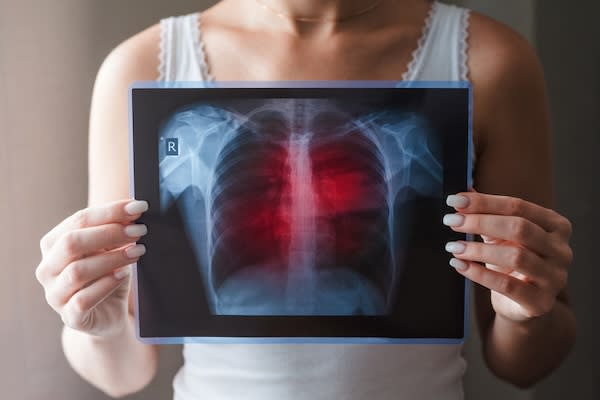Transanal Minimally Invasive Surgery (TAMIS)
Innovative Treatment for Early Rectal Cancers and Polyps
Early-stage cancerous tumors or benign (non-cancerous) polyps in your rectum need prompt, effective, and precise treatment. At the Providence Swedish Cancer Institute, our surgical experts use TAMIS — a minimally invasive outpatient procedure — to remove tumors and polyps with fewer complications, faster recovery, and no need for a hospital stay.

Treatment Overview
At the Providence Swedish Cancer Institute, our expert colorectal surgeons have extensive experience performing TAMIS to treat or manage early rectal cancer and remove polyps before they become cancerous.
TAMIS is a minimally invasive outpatient procedure. Since there are no incisions, recovery from TAMIS is generally quicker and with less pain and fewer possible complications than traditional surgery.
During the procedure, your surgeon inserts a flexible tube, called a port, into your anus. Through this port, they use specialized instruments, including a high-definition camera, to carefully view and remove the tumor or polyp. The camera provides a magnified view to guide precise surgical movements, and the surgeon can then repair the area after the tumor or polyp is removed.
What to Expect
At the Providence Swedish Cancer Institute, we’ll guide you through the planning stages of your procedure through to discharge, recovery, and future treatment if needed. Your care team is here to support your physical healing, emotional well-being, and personal goals, so you can move forward with confidence.
About a week before your surgery, we’ll schedule a pre-admission visit to:
- Assist with remaining pre-surgical lab work or tests
- Review what will happen during your surgery
- Explain potential side effects
- Discuss medications and post-surgery care, including equipment if needed
You'll receive information to prepare for your admission to the clinic. If you have any questions after this appointment, you can reach out to your nurse or care coordinator, who will be happy to help.
TAMIS is typically outpatient surgery, so most people go home on the same day. You’ll need a responsible adult to drive you because anesthetic can have lasting effects. Most people can return to light daily duties within a few days. Your care team will give you instructions on how to manage your discomfort, monitor your recovery, and what you should avoid for the first couple of days, like heavy lifting or straining when you have bowel movements.
Since TAMIS is usually done on an outpatient basis, you typically won’t be admitted to the hospital. There are no incisions as with traditional surgery, so there’s less pain and no scarring. For eligible patients, TAMIS may support a faster recovery — benefiting both physical healing and emotional wellbeing.
As with any surgery, there are risks, including:
- Infection
- Rectal bleeding
- Inflammation around your rectum
- Leaking or seeping stool
- Difficulty urinating (retention)
- Narrowing of the rectum
TAMIS has a low rate of complications. Your care team will talk with you about these risks, answer your questions, and help you make an informed decision that aligns with your treatment goals.
You’ll have several follow-up appointments after your procedure for the first few weeks. This helps us monitor your healing and manage any complications. As time goes on, your appointments will be less frequent, but regular checkups are required so that we can continue to manage any of your ongoing treatment needs and watch for any signs of recurrence.
Services are also available to help you through every treatment stage.
Learn more about our supportive care services.
Frequently Asked Questions
Whether you’re a candidate for TAMIS depends on how advanced your rectal cancer diagnosis is, how large the tumors are, and where they are. TAMIS is most often used for early-stage tumors. If the tumors are too large or deep in the tissue, or far up in the rectum, your doctor will work with you to find a treatment plan that is recommended for your specific diagnosis. TAMIS is also used to remove benign (non-cancerous) polyps.
While TAMIS is most often used to remove early-stage cancers and benign polyps, it can also play a role in caring for people with advanced rectal cancer. In these cases, large tumors may be causing pain or making it difficult to have bowel movements. TAMIS can be used to remove or reduce these tumors as part of palliative, or comfort-focused, care, helping to relieve symptoms and improve quality of life.
Your care team will give you detailed instructions to help you prepare for TAMIS. In general, preparation involves a bowel prep—similar to prepping for a colonoscopy to fully empty your bowels. Fasting—avoiding food—for several hours before the procedure is also required. If you take any medications, your team will let you know which ones to continue and which ones to pause leading up to surgery.
Most people who have TAMIS receive general anesthesia, which can cause drowsiness and affect coordination for several hours afterward. For your safety, it’s important to have someone stay with you for the first 24 hours to help you get home and support you while you recover.
Generally, as long as you feel well, you should be able to eat and drink on the same day as your procedure. If you’re feeling nauseated, starting slowly with light foods is best. Your care team will discuss what food and drinks are recommended and what you should avoid. For example, you might be encouraged to drink more fluids to keep from getting constipated and to avoid high-fiber foods that might make your stools too firm and difficult to push out while you heal.
Most people return to their usual bowel habits after healing from TAMIS. In some cases, you might first have some difficulty controlling your bowel movements or passing gas. You also might feel a sense of urgency around needing to go to the bathroom right away. Talk to your care team if you’re concerned about your bowel movements.
We provide a full range of supportive care services to support you during and after your cancer treatment. Some of these services include:
- Art therapists
- Cancer rehabilitation (onco-physiatry)
- Care coordinators
- Genetic counseling (cancer geneticist)
- Health educators
- Medical massage (edema, lymphedema management)
- Music therapist
- Naturopaths
- Nutritionists
- Oncology nurses
- Social workers
- Speech and language pathology
We can also help with finances, food, transportation, and other challenges for eligible patients through our patient assistance fund.
See the full list of supportive care services.
Note: Some services are provided by local partners and vary based on location. Please contact your clinic for more information.
News & Info From Our Experts



